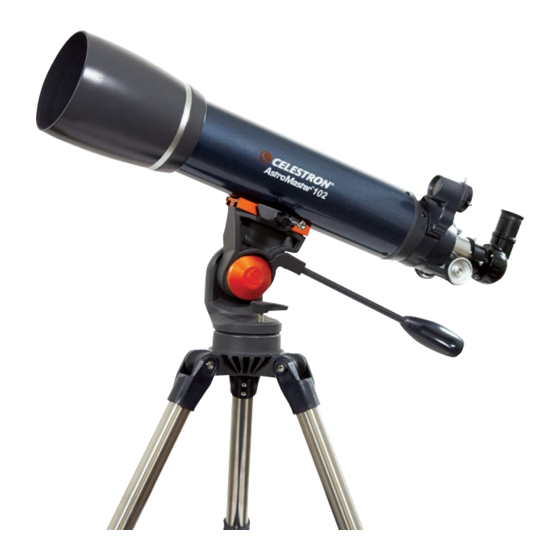Celestron AstroMaster 102AZ Manual de instrucciones - Página 10
Navegue en línea o descargue pdf Manual de instrucciones para Telescopio Celestron AstroMaster 102AZ. Celestron AstroMaster 102AZ 20 páginas. 102 mm refractor

FOCUSING
To focus your refractor, simply turn the focus knob located directly below the eyepiece holder (see Figure 1) Turning the
knob clockwise allows you to focus on an object that is farther than the one you are currently observing Turning the knob
counterclockwise from you allows you to focus on an object closer than the one you are currently observing
NOTE:
If you wear corrective lenses (specifically glasses), you may want to remove them when observing with an eyepiece attached to the telescope. However, when using a camera you
should always wear corrective lenses to ensure the sharpest possible focus. If you have astigmatism, corrective lenses must be worn at all times.
ALIGNING THE RED DOT FINDER
The red dot finder is the quickest and easiest way to point your telescope exactly at a desired object in the sky It's like
having a laser pointer that you can shine directly onto the night sky The red dot finder is a zero magnification pointing tool
that uses a coated glass window to superimpose the image of a small red dot onto the night sky With both eyes open,
look through the red dot finder and simply move your telescope until the red dot, seen through the red dot finder, merges
with the object as seen with your unaided eye The red dot is produced by a light-emitting diode (LED); it is not a laser
beam and will not damage the glass window or your eye The red dot finder is powered by a long life 3-volt lithium battery
(#CR1620) see Figure 3-3 Like all finderscopes, the red dot finder must be properly aligned with the main telescope
before it can be used The alignment procedure is best done at night since the LED dot will be difficult to see during the day
Battery
Compartment
To align the red dot finder:
1 To turn on the red dot finder, turn the switch to the "on" position (Figure 3-3)
2 Locate a bright star or planet and center it in a low power eyepiece in the main telescope
3 With both eyes open, look through the glass window at the alignment star If the red dot finder is perfectly aligned, you
will see the red LED dot overlap the alignment star If the red dot finder is not aligned, take notice of where the red dot
is relative to the bright star
4 Without moving the main telescope, turn the red dot finder's two adjustment screws until the red dot is directly over the
alignment star Experiment as to which way each screw moves the red dot
5 The red dot finder is now ready for use Always turn the power off after you have found an object This will extend the
life of both the battery and the LED
NOTE:
Your battery may already be installed. If not, open the battery compartment (Figure 3-3) with a thin coin or screwdriver. Put the battery in with the "+" sign facing out. Then, put the
battery compartment back on. If you ever need to replace the battery, it is a 3-volt lithium type # CR 1620.
NOTE:
The above procedure applies for astronomical observation. But if your finderscope is aligned properly, you can also use it for terrestrial applications. The finderscope acts like a
sighting tube. The red dot may be difficult to see in the daytime, but the dot will let you align objects before looking through the main telescope optics and can be quite helpful.
NOTE:
If you plan on storing the telescope for a long period of time, remove the battery to prevent discharge.
10
| ENGLISH
On/Off Switch
Fig. 3-3
Fig. 3-4
